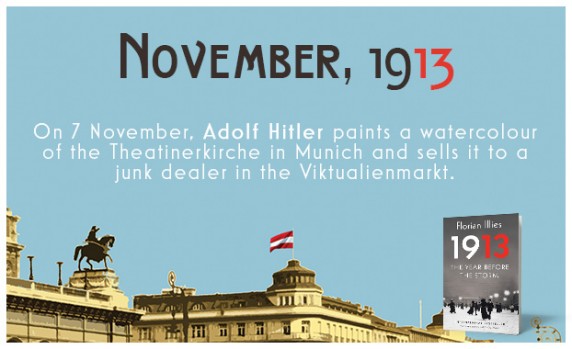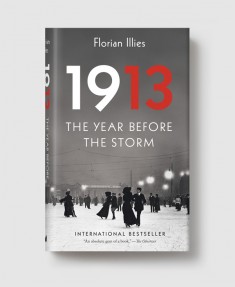November 8, 2013
This week in 1913: Camus is born, Hitler paints a picture, and Kafka takes two trains
by Melville House
Just before one of its darkest moments came the twentieth century’s most exciting year . . .It was the year Henry Ford first put a conveyer belt in his car factory, and the year Louis Armstrong first picked up a trumpet. It was the year Charlie Chaplin signed his first movie contract, and Coco Chanel and Prada opened their first dress shops. It was the yearProust began his opus, Stravinsky wrote The Rite of Spring, and the first Armory Show in New York introduced the world to Picasso and the world of abstract art. It was the year the recreational drug now known as ecstasy was invented.
It was 1913, the year before the world plunged into the catastrophic darkness of World War I.
NOVEMBER 4-10
November 7: Albert Camus is born. He will later write the play The Possessed.
The lead magazine of the year: in Vienna—what a coincidence—on 7 November the first issue of the magazine The Possessed is published. On the front page: a self-portrait of Egon Schiele. Subtitle of the magazine: “A journal of passions.”
Adolf Hitler paints a watercolor of the Theatinerkirche in Munich and sells it to a junk dealer in the Viktualienmarkt.
November 8: On 8 November in the Residenztheater in Munich the unfinished drama Woyzeck, written in 1836 by Georg Büchner, who was born in 1813, is given its première, after years of lobbying. Rilke is speechless with enthusiasm: “It is a play like no other, that abused human being standing in his stable-jacket in the universe, malgré lui, in the infinite procession of the stars. That is theatre, that is what theatre could be.” But it is above all the celebration of a unique kind of language that runs around between hallucination and fairy tale, the gutter and poetry, and comes down on you like a buzzard. At the end of the play a fairy tale is told about a lonely child:
And since there was no one left on earth, it wanted to go to heaven, and the moon looked down on it so kindly and when at last it came to the moon it was a piece of rotten wood and then it went to the sun and when it came to the sun it was a withered sunflower. And when it came to the stars, they were little golden flies, stuck on the way the shrike sticks them to the blackthorn and when it wanted to go back to earth, the earth was an upturned pot and the child was all alone.
This was a fairy tale very much in line with the taste of 1913. Unconsoling, beyond any utopian thoughts but full of poetry.
On 8 November, at 10:27 p.m., after an eight-hour train journey, Franz Kafka arrives at Anhalt Station in Berlin. At the end of October, Grete Bloch, Felice Bauer’s friend, had stepped in as an intermediary between Prague and Berlin and attempted a reconciliation between the unhappy lovers.
November 9: On 9 November, the German day of destiny, the two of them meet for a second time in Berlin. Again it is a tragedy. In the late morning they walk through the Tiergarten for an hour. Then Felice has to go to a funeral, after which she says she will call at Kafka’s hotel, the Askanischer Hof. She doesn’t. It rains slowly and incessantly. Again Kafka sits in the hotel, as he did in March, waiting for news from Felice. But nothing happens. At 4:28 p.m. Kafka boards the train for Prague.
On the same 9 November in Berlin, the well-known psychoanalyst and author Otto Gross is arrested by Prussian police officers in Franz Jung’s flat and extradited to Austria. There his father declares him insane, and he is committed to the sanatorium at Tulln. It is a battle between father and son, a generational conflict of a very different kind. Controlling the uncontrollable son by declaring him unfit to handle his own affairs.

